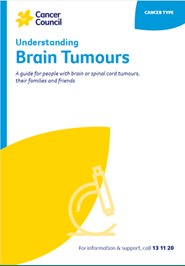- Home
- Brain tumours
- Symptoms
Brain cancer symptoms
Symptoms you may experience depend on where the tumour is, its size and how slowly or quickly it is growing. Symptoms can develop suddenly (in days or weeks) or over time (months or years).
Many symptoms are the same as other conditions, but see your doctor about any new, persistent or worsening symptoms.
Learn more about:
General symptoms
Brain tumours can increase pressure inside the skull (intracranial pressure). Pressure can build up because the tumour is taking up too much space, is causing brain swelling or is blocking the flow of cerebrospinal fluid around the brain (see Having a shunt).
This increased pressure can lead to symptoms such as:
- headaches – often worse when you wake up
- nausea and vomiting – often worse in the morning or after changing position (e.g. moving from sitting to standing)
- confusion and irritability
- blurred or double vision
- seizures (fits) – might cause some jerking or twitching of your hands, arms or legs, or affect the whole body
- weakness in parts of the body
- poor coordination
- drowsiness or loss of consciousness
- difficulty speaking or finding the right words.
Learn more about specific symptoms caused by the location of the tumour below.
Having a brain tumour is stressful and upsetting. Experienced counsellors, psychologists or psychiatrists can offer coping strategies and ways to manage any mood swings or behavioural changes. Call Cancer Council 13 11 20 for information or support.
Symptoms caused by the position of the tumor
Other symptoms depend on where the tumour is located in the brain or spinal cord – see below for more on this.
Common tumour symptoms
The symptoms you experience will depend on where the tumour is in the brain or spinal cord. See the previous page for general symptoms caused by pressure in the skull.

Part of the brain |
Symptoms |
| Frontal lobe |
|
| Parietal lobe |
|
| Temporal lobe |
|
| Occipital lobe |
|
| Meninges |
|
| Cerebellum |
|
| Spinal cord |
|
| Pituitary gland |
|
| Brain stem |
|
Nerve tumours and other tumours
Symptoms of tumours starting in the brain’s nerves (cranial nerves) depend on the affected nerve. The most common nerve tumours are vestibular schwannomas (acoustic neuromas). They can cause hearing loss, dizziness and balance issues. Vestibular schwannomas are usually benign. Tumours of the pineal gland (deep within the brain) are very rare and usually classified as neuroendocrine tumours.
→ READ MORE: Brain cancer diagnosis
Podcast: The Thing About Cancer
Listen now
More resources
Prof Lindy Jeffree, Director of Neurosurgery, Alfred Health, VIC; Caitriona Nienaber, 13 11 20 Consultant, Cancer Council WA; Prof Tamara Ownsworth, Clinical Neuropsychologist and Research Director, The Hopkins Centre, Griffith University, QLD; A/Prof Hao-Wen Sim, Medical Oncologist, The Kinghorn Cancer Centre and Chris O’Brien Lifehouse, NSW; Megan Trevethan, Clinical Specialist Occupational Therapy – Cancer and Lymphoedema Services, Princess Alexandra Hospital, QLD; Chris Twyford, Cancer Specialist Nurse, Canberra Health Services, Cancer and Ambulatory Support, ACT; Dr Adam Wells, Clinical Academic Consultant Neurosurgeon, The University of Adelaide, Royal Adelaide Hospital, SA.
View the Cancer Council NSW editorial policy.
View all publications or call 13 11 20 for free printed copies.

